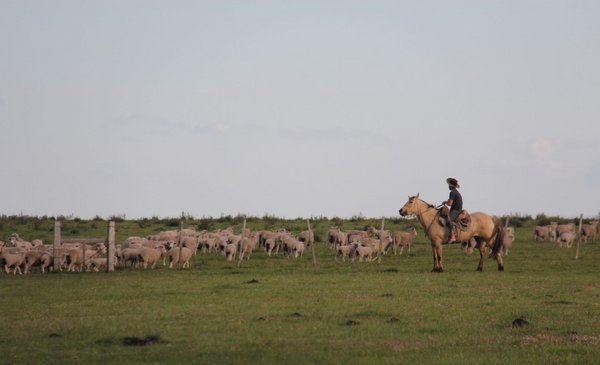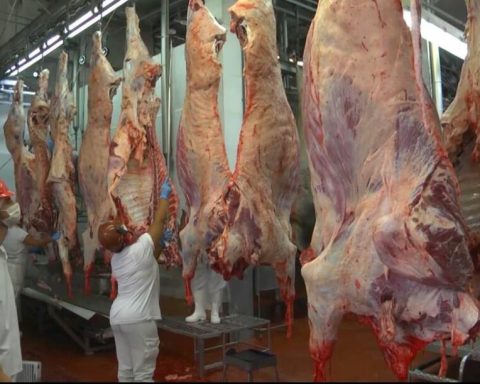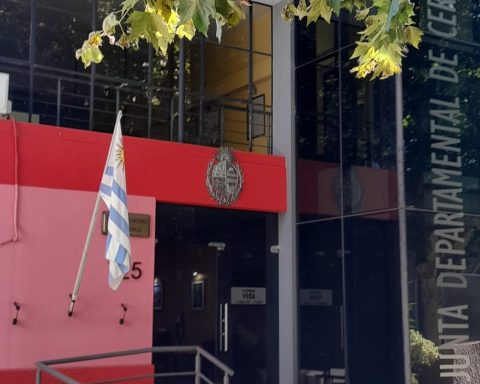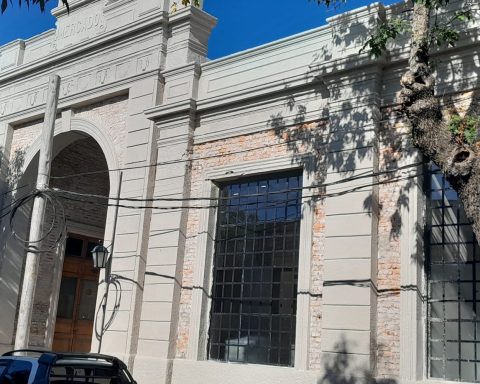In the exhibition called Salto Ovino there was a varied menu of activities. Some examples were a contest for heavy lambs, another for grills, talents were also compared in skills for handling sheep and a demonstration of cuts of sheep meat was carried out. Also, there was a contest postmortem and in that instance, among various awards, the most relevant went to the Texeira Nuñez Devotto family: with a lamb –member of the 2nd best double-purpose standing lot–, they kept first the cocarda corresponding to the “Best dual purpose heavy channel” and then with the highest distinction: “Best channel of the contest”.
The achievement was achieved with a Romney Marsh lamb. The dynamic consisted in that of the 23 batches that participated in different categories in the standing oath, each exhibitor selected a specimen to send to slaughter and compete based on quality and butcher performance.
In that instance, he defined a jury made up of Dr. Alba Gallo and Dr. Fernando Rovira (both from the National Meat Institute), and engineer Jorge Aguerre (from the Uruguayan Wool Secretariat).
Salto Ovino (from August 5 to 7), traditionally organized by the Agricultural Association of Salto (AAS) in its fairgrounds, stopped taking place for a few years, returned this year and had as a differential that The organization was dealt with for the first time by the group of young people from that union, the Agricultural Association of Young People of Salto.
Walter Texeira Nuñez, administrator of the Las Negras establishment – owned by his wife, María Angélica Devotto – told The Observer that there is no special preparation of the lot for the standing contest. “Of the animals that we are preparing in the natural field to send to slaughter, we separated five that were even and we presented them to the contest standing and one of those was the one that we chose to send to the postmortem”, he explained.
The slaughter and subsequent evaluation of the jury took place in the Daymán Meat refrigerator.
Texeira Nuñez combines her productive activities with that of public accountant and agricultural unionism. He is currently a director in the AAS, in the Asociación Fomento Rural de Valentín and a councilor in the Rural Federation.
The best channels of the contest.
From Palma Sola, in Artigas
The family establishment is in Palma Sola, in Artigas. There is exclusively livestock production there, with sheep of the Romney Marsh breeds and bovines of the Hereford and Shorthorn breeds.
“We do cattle and sheep farming, in natural fields, managing strategic supplementation in some categories of cattle that need it. We make an incomplete cycle, we take the calves to finish elsewhere. We are coming out of a major drought, now everything is very green but there is little grass, we had to lower the staff a lot”, he commented.

Romney Marsh at the Las Negras establishment.
The award, for “Mingo”
“In my paternal family we chose to produce with the Corriedale and Hereford breeds, but in my wife’s we decided to continue with Romney Marsh, based on the very good flock that my father-in-law (Domingo “Mingo” Devotto) formed, who passed away. 27 years ago, therefore we feel in the whole family that this award, which we achieved for the first time, is a beautiful recognition of everything he did”he detailed.
He added that, interestingly, it is common for people who raise Romney Marsh to also undertake management with the Shorthorn breed, as was the case with his father-in-law. “I like, in my case, the Hereford cross with the Shorthorn,” he stressed.

Romney Marsh at the Las Negras establishment.
The virtues of Romney Marsh
Romney Marsh commented, “It is a breed that I like very much, for something I always say that it is the 4 x 4 of sheep, it is a very resistant breed, very rustic, very prolific, they are excellent mothers, they are extremely easy to fatten, it does not require much work on the subject of health because it does not have a problem with Pietín, it is a breed whose place of origin is a lower part of England, it adapts very well to humid places and another advantage is that a very good signal is achieved with lambs that are very cute and very lively”.
One detail to keep in mind is that although the Romney Marsh produces a lot of wool, a very important fleece, with a lot of weight, it is a thick wool and at the moment in the market it is very difficult to market this type of wool, despite that is compensating with the good price that is achieved for the meat.
Regarding the meat, he explained that “it is very tasty, it has a lot of quality”.

Romney Marsh at the Las Negras establishment.
Texeira Nuñez, regarding the management she does with the Romney Marsh, indicated that “it is all in the field, we work in the natural field, in the rearing and fattening of heavy lambs”, with animals that when they are ready for slaughter are marketed within the framework of the Central Lanera Uruguaya Heavy Lamb Operation.
Heavy lambs come out weighing 40 to 45 kilos, after 12 to 14 months, on average. The lamb that won the postmortem live weighed 46 kilos, the carcass weighed 23.3 kilos, had a yield of 50.7% and fat 10%.
“In my wife’s family and mine we have more than 150 years, several generations, working in the countryside of northern Uruguay, where sheep have played a very important role in rooting people, to colonize basalt soils, where the options to produce are less. That is why, sincerely, we are very happy with this award, the whole family enjoyed it, we consider it a prize for ‘Mingo’ Devotto, he left us the basea very good herd that with my wife we try to follow and improve it, selecting based on the criteria that we like and buying good breeders”, he concluded.

Romney Marsh at the Las Negras establishment.
Dog attacks: lack of energy
Texeira Nuñez, on issues of constant consideration in the sheep sector –from his role as director of the Salto Agricultural Association, of the Valentín Rural Development Association and advisor to the Rural Federation– expressed the opinion that “The attack of dogs on sheepfolds today is much more worrying than cattle rustling, where the tone has changed because the Police have more support and means to fulfill their task”.
“From the Rural Federation we have been participating in the National Institute of Animal Welfare (INBA) and before in other commissions, but we do not see that the issue is being addressed with the energy that should be put, at least in the short term,” he said. .
He added that “The super population of dogs that we have is not only a problem for sheep, it is a problem for people’s health, loose dogs cause accidents that leave very serious consequences, we do not understand why dogs end up being prioritized before humans, no It should be like that”.
On the health issue, he pointed out that what most complicates – and especially in Artigas – is the advance of the tick, a parasite that has generated a lot of resistance to treatment, but he also said that “although it seems incredible, some cases of scabies continue to appear , something that is not so difficult to combat.
He mentioned that the possibility of exporting live sheep to Brazil is seen as something “very good”. “The Artigas Agricultural Association fought hard and for a long time to make this a reality, it was recently put together, all the bureaucratic issues were resolved and we hope it will be activated because it would be a nice escape valve when it is convenient for the refrigerators to prioritize the slaughter of cattle and not that of sheep”, he explained.
He also considered that “The country has an enormous opportunity to advance for the good of all with the free trade agreement with China, we must continue opening markets because it depends on that not only the growth of agriculture and related people, with that the whole country will grow”.

EO

Walter Texeira Nunez.


















